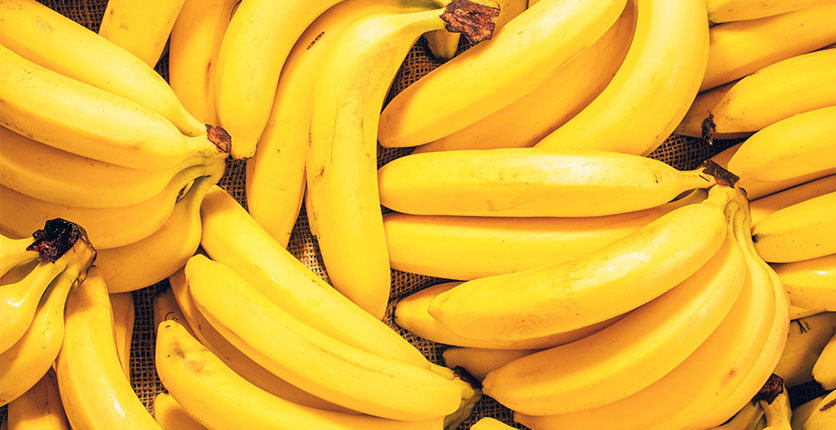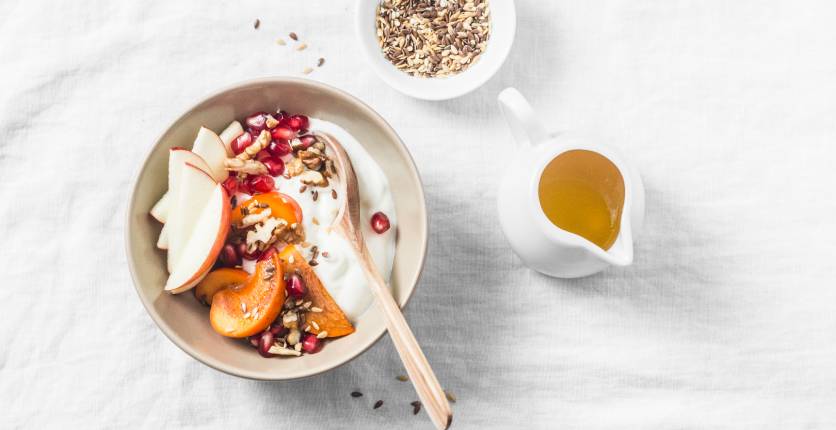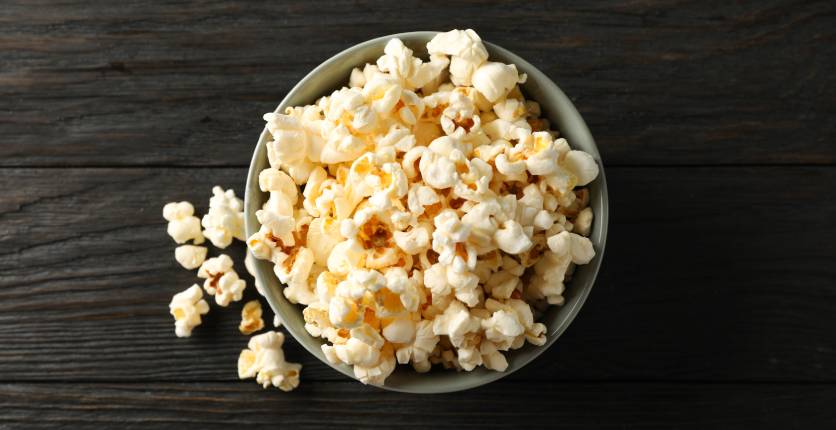On gruelling work days, you might just be tempted to binge on bites to ease the stress or to charge up your batteries. Our advice: Skip the candies, potato chips and other such “empty calorie” snacks that are likely to give you instant energy and gratification but yield little benefit by way of your health, and aim for bananas, yoghurt, popcorn and dark chocolate instead. Why these four? Because they are equally tasty, easy to get and portion out in controllable amounts, and are loaded with more vitamins, minerals, and other such great-for-body-and-brain nutrients. Oh, and why only four healthy snacks, when when most of us have five work days? Because – not counting how you plan your weekend diet – you might like Friday to be your cheat day Fri-yay. So, start munching through this list when Monday rolls round.

Bananas
These yellow fruits aren’t just for monkeys; they are also for Great Apes like us. They are sweet, convenient to buy and are as trouble-free as plug & play devices – just peel and eat (no washing needed). Why you should snack on one to up your energy level: It refuels you quick (one medium banana can provide about 105 calories), is a great source of complex carbs and natural sugars, and is rich in fibre that helps slow the digestion of said sugars and lets you feel fuller over a longer period of time. Plus, bananas also contain nutrients, antioxidants and vitamins such as potassium, folate, lectin and vitamins B5 and C, all of which not only contribute to the fruits’ energy-giving prowess but also their general health benefits.
Tips for these eats: Bananas ripen fast when not hung, even faster in a paper bag, but slower when refrigerated (the peel might darken, but the flesh will still be fresh). Slice ’em and dice ’em to add to your cereal or oatmeal brekkie, or blend them into your smoothie if you don’t want to go wild on them (i.e. eat them on their own), but ingest them, more urban-like.

Yoghurt
Why this should be your fave nom-nom of the day: It can be a snack, a dessert-slash-drink and delish diet must-have; comes in dozens of flavours; and is conveniently packaged and found at most supermarkets and marts. This centuries-old fermented dairy product is known for providing lots of protein (in the form of either whey or casein), simple sugar carbs (lactose and galactose) and different kinds of fatty acids and fat levels (whole, low-fat or fat-free). Also, found in almost all kinds of yoghurts out there on the market, are probiotics, the beloved friendly, live bacteria that aid in improving overall gut health. Depending on the type of yoghurt, this creamy delight is said to also help with general bone health, appetite control and weight management, and immunity, as most yoghurt contain a host of nutrients, and may pack beneficial amounts of B vitamins, riboflavin, calcium, phosphorus, magnesium and potassium. Energy-wise, a 100-gram cup of plain, whole-milk yoghurt can contain about 60 calories.
Tips for these eats: There are tonnes of yoghurt brands and flavours out there, so you are spoilt for choice whenever you feel peckish, low on energy and need some lovin’ spoonfuls of this – you can always start with the ever-popular Greek yoghurt varieties if you are unsure. But, do take note that if you are lactose intolerant or have a milk allergy, that this snack is not entirely suitable for you. Also, some yummy ones contain high amounts of sugar (full-fat ones tend to have lots) so you might want to peruse the ingredient label carefully. Choose wisely, and pick one that preferably has live and active cultures (they yield more digestive health points), and is plain and unsweetened. You can always add some bananas slices (see above) or nuts for more yum.

Popcorn
Like bananas, popcorn is full of carbs but also contains huge amounts of fibre (15 grams per 100 grams of air-popped ones, making it one of the best fibre sources) to help slow your digestion so it can let you fuel up fast and also fuller for longer, than other pop-into-your-mouth digestables. These heated-up kernels have phenolic acids and polyphenol antioxidants, vitamins B1, B3 and B6, and minerals such as iron, magnesium, manganese and phosphorus. As such, being a wholesome whole grain, popcorn is said to act as capable assists in the reduction of inflammation, and improvements in digestive health and blood circulation. And what about its energy-bestowing ability? A typical 100-gram serving of air-popped popcorn without any kind of seasoning or topping, might bestow you some 370-plus calories.
Tips for these eats: Before you start, err, popping out that pre-packaged popcorn pack to “celebr-eat”, these corn snacks are only considered beneficial if you don’t have them super Salt-Bae-seasoned with salt, butter, caramel or any other calorific seasonings and toppings. So, skip the ready-made ones that may come with extra flavourings and try your hand at making air-popped ones with some olive oil or coconut oil in a pot – it’s fun to do while you are WFH. If you must add some taste, then sprinkle fresh herbs and spices, or throw on sweet natural nut butter, cinnamon or dark chocolate powder (see below).

Dark Chocolate
Must… have… candy…? We hear you – if your sweet tooth rules the day (or, actually, your life), make dark chocolate your go-to afternoon guilty pleasure. While it usually has less sugar than regular milk chocolate – meaning that you get less zippity energy – dark choco has more cocoa content. The trade off is that you get more benefits from the antioxidants and flavanoids within (the activity of which, is said to be higher than that of some fruits) to help battle against free radicals and improve heart health. A 100-gram dark chocolate bar with 70-85% cocoa offers an estimated 600 calories, and is loaded with minerals such as iron, magnesium, copper, manganese, potassium, phosphorus, zinc and selenium (wowee-zowie!). Plus, dark chocolate contains stimulants like caffeine and theobromine in minute amounts to liven your mood and give you a little daytime brainpower zap without turning you into a brainless, sleepless zombie at night.
Tips for these eats: While these dark ones are less evil than your standard milk ones in terms of calories (about two-thirds less nefarious, or so), it doesn’t mean you should start buying family-sized blocks for one (a.k.a. you). Try limiting yourself to a bar or half, or better yet, small-sized squares as a little perk-me-up teatime dessert. Also, look for quality ones with a higher cocoa content – start with 70% for a taste – before buying. You don’t want to get the wrong kind to only realise a month later that it’s not just your daily energy level’s that gone up, but also your weight.
Featured image: Shutterstock







